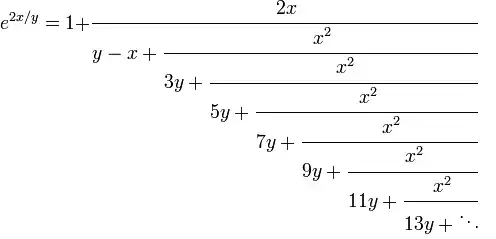We can also use a non-simple continued fraction expansion of $\displaystyle e^{2x/y}$ to prove the irrationality of $\displaystyle e^{2x/y}$ when $\displaystyle x,y$ are positive integers. Thus if $\displaystyle \log n = x/y$, then $\displaystyle e^{2x/y} = n^2 $ is rational, contradicting irrationality of $\displaystyle e^{2x/y}$.
Incidentally, the first proof of irrationality of $\pi$ by Lambert used a continued fraction expansion (of $\tan x$, I believe).
The expansion we use:

and the theorem we use to prove irrationality is quoted in the wiki page for Generalized Continued Fractions here: Conditions of Irrationality.
By this theorem, it is enough that for all sufficiently large positive integers $\displaystyle m$ we have that $\displaystyle (2m+1)y \gt x^2$, which is true for fixed $\displaystyle x,y$.
